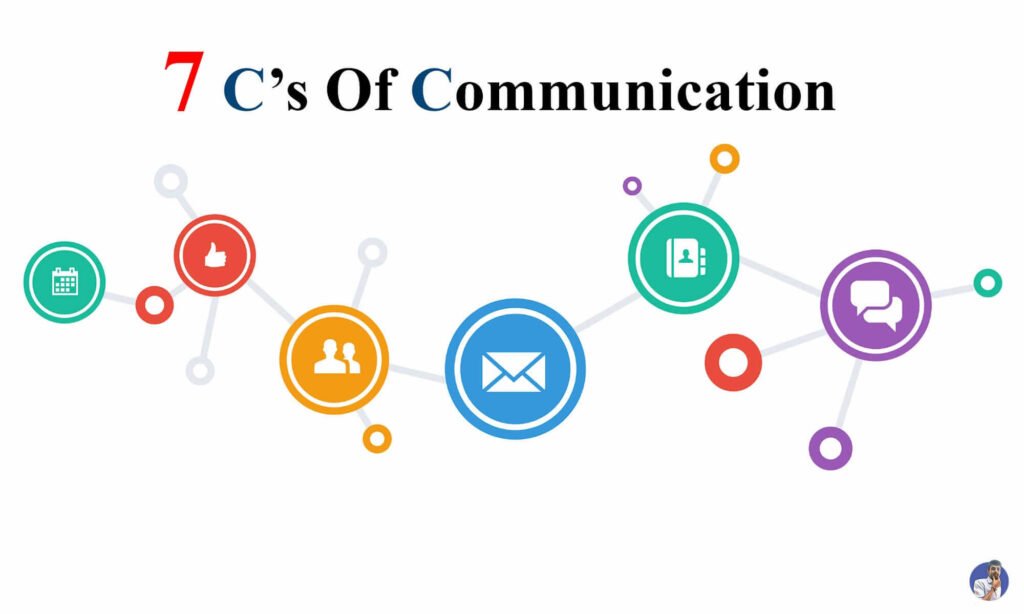The 7 C's of Communication: Mastering Effective Communication Skills

Effective communication is crucial in all aspects of life, whether it's personal relationships, professional settings, or even everyday interactions.
The Seven Cs of Communication provide a comprehensive guide to mastering the art of effective communication.
These seven elements - Clarity, Conciseness, Consideration, Completeness, Correctness, Concreteness, and Courtesy - form the foundation for clear and impactful communication.
By understanding and implementing these principles, you can enhance your communication skills and ensure that your message is received and understood in the most effective way possible.
So, let's delve into the world of the Seven Cs and discover how they can transform your communication abilities.
What are the Seven Cs of Communication?
The Seven Cs is a framework that outlines the key elements for successful interplay.
These components include lucidity, compactness, thoughtfulness, exhaustiveness, exactness, concreteness, and politeness. Each one of these Cs plays a critical role in guaranteeing that the transference of messages is clear, succinct, and considerate.
When implemented adeptly, the Seven Cs can help people perfect the art of conveying information in a way that is both powerful and easily comprehended.
Effective interplay commences with clarity. Lucidity guarantees that the transference is easily understood by its proposed crowd. It involves using simplistic and straightforward language and abstaining from jargon or technical terms that may puzzle or alienate the receiver.
By discarding superfluous complexity, lucidity helps to create a bridge between the sender and the recipient, allowing an effortless flow of information. In addition to lucidity, compactness is another essential aspect of successful communication.
Being succinct means being able to communicate a message with conciseness, using only the necessary words and avoiding irrelevant details. This helps to keep the dialogue focused and prevents the crowd from becoming overwhelmed or apathetic.
The Seven Cs emphasize the importance of lucidity and succinctness as essential elements for efficient interplay.
Thoughtfulness is another critical element of effective communication. It involves being cognizant of the audience's requirements, perspectives, and emotions. By thinking of the crowd, the sender can adjust the message to make sure it resonates with the recipient.
This involves being compassionate, understanding the circumstance in which the communication takes place, and adjusting the transference accordingly.
In addition to thoughtfulness, exhaustiveness is imperative for successful communication. Exhaustiveness guarantees that all necessary information is included in the message.
This implies delivering the crowd with all the pertinent details, facts, and instructions they need to understand and act upon the transference.
The Seven Cs of communication underscore the importance of thoughtfulness and exhaustiveness as crucial factors for effective interplay.
Why is the Seven Cs of Communication important?
Having the ability to effectively express yourself and understand others is essential for success in all areas of life - from your relationships to your professional endeavors. That's why mastering the Seven Cs of Communication is so valuable.
This framework provides a guideline for improving communication skills, from ensuring clarity and conciseness to being considerate and courteous. By following these principles, you can avoid misunderstandings and conflicts, while also building stronger connections.
In today's fast-paced, interconnected world, having a mastery of these concepts is even more important for achieving your goals and making the most of every interaction.
Examples of the Seven Cs of Communication
Clarity is key when it comes to getting your point across. A teacher can illustrate a complex idea simply and understandably, making certain that each student comprehends the message. Similarly, customer service representatives can provide straightforward instructions, leaving no room for misinterpretation.
Maintaining clarity in your communication ensures that your audience grasps your message precisely as intended.
Brevity is essential when delivering a message.
A TED Talk presenter speaks concisely, avoiding unnecessary detail to get their point across. Similarly, a concise email or memo saves time and ensures the recipient understands the main points.
Being succinct in your communication captures the attention of your listeners and facilitates the transmission of your message.
Considering the needs, preferences, and perspectives of the audience is essential for successful communication. A manager might take different communication styles into account and modify their approach accordingly.
Likewise, a salesperson may fine-tune their pitch based on the specific requirements and interests of potential customers. Taking into account the preferences of your audience allows you to tailor your message to reach them more effectively.
To ensure that your message is fully conveyed, completeness is of the utmost importance. When writing a report, all relevant data, analyses, and conclusions must be included.
In a conversation, covering all relevant points and responding to any questions or concerns is essential for completeness.
Being thorough in your communication avoids leaving listeners with unanswered questions or gaps in understanding and helps to ensure that your message is conveyed accurately.
How to use the Seven Cs of Communication
To build effective communication, it is essential to first comprehend each component and how it contribute to unambiguous and succinct dialogue.
Start by making certain lucidity in your missive by utilizing uncomplicated language and abstaining from technical jargon. Furthermore, contemplate the needs and outlook of your audience, demonstrating thoughtfulness in your discourse.
To be thorough in your interaction, supply all needed data and address any potential questions or apprehensions. Correctness is also critical, so make sure to utilize appropriate grammar and steer clear of any factual mistakes.
Lastly, show politeness in your discourse by being respectful and courteous in your tone and selection of words.
To further upgrade your communicative skills, it is practical to follow a checklist founded on the Seven Cs.
Begin by surveying your message for clarity, verifying that your designed import is readily discernible. Subsequently, concentrate on brevity by discarding superfluous words or data.
Contemplate the needs and outlook of your audience, and modify your message consequently for maximum effect.
Fulness is imperative, so make sure to furnish all pertinent particulars and address any possible questions or worries.
Correctness is also essential, so double-check your grammar and correctness.
Finally, aim for definiteness by utilizing particular examples and shunning hazy or ambiguous language.
By adhering to these guidelines, you can proficiently utilize the Seven Cs of Communication to upgrade your communicative abilities.
Benefits of the Seven Cs of Communication
Mastering the Seven Cs of Interaction can bring about a plethora of advantages.
Adhering to these principles - clarity, brevity, thoughtfulness, completeness, accuracy, concreteness, and courtesy - can unfurl the doors to better communication.
First and foremost, articulate dialogue prevents confusion and ensures the intended message is accurately conveyed.
This leads to more robust relationships, both personally and professionally. Additionally, succinct conversation saves time and permits expedient exchange of data.
It assists people in getting to the crux quickly and effectively, conserving both their own and others' time. Moreover, regard in communication encourages empathy and appreciation towards others, fostering stronger connections and partnerships.
By being conscious of others' views and needs, individuals can create a more welcoming and harmonious atmosphere.
Embracing the Seven Cs of Communication is not just a choice, but rather an essential component of effective communication in various aspects of life.
Leave a Reply




Related Posts